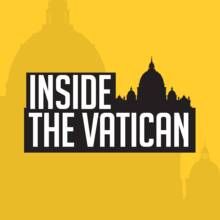For the first time, a woman will have the right to vote in the Synod of Bishops.
Sister Nathalie Becquart, a Xaviere sister, became the first woman to be named undersecretary of the Vatican’s Synod of Bishops, a position previously reserved to bishops. As is customary for the undersecretary, Sister Becquart is expected to be a voting member of the 2022 synod. Until now, women have been barred from voting in synods.
Listen to “Inside the Vatican” on Apple Podcasts and Spotify.
This week on “Inside the Vatican,” host Colleen Dulle and Vatican correspondent Gerard O’Connell explain the significance of Sister Becquart’s appointment and what it could mean for future synods. As for whether other women could be able to vote in upcoming synods, Gerry said, “I think we may even see that in the synod on synodality. It is under consideration.”
Colleen and Gerry also discuss Pope Francis’ trip to Iraq, which was confirmed this week, and his address to the world’s ambassadors to the Vatican. The pope described seven global crises that have been worsened by the coronavirus pandemic and said the “crisis of politics” underlies them all.
Links from the show:
Colleen Dulle | Why can’t women vote at the Synod on Young People?
Pope Francis: In 2021, vaccines, fraternity and hope are the medicine we need.







